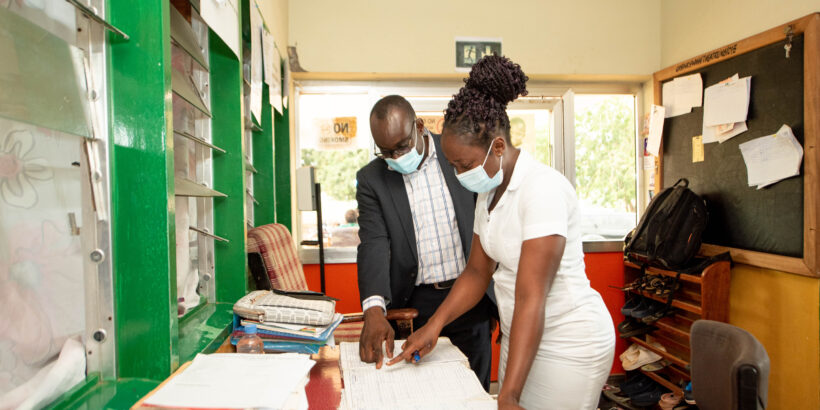In January 2023, Kwasi (a pseudonym) was a patient at Afrancho Polyclinic in the Afigya Kwabre South District of the Ashanti Region of Ghana. He had been in the hospital for three days and looked tired when I passed him during a routine monitoring visit. I chatted briefly with Kwasi and learned how typhoid had affected him.
Patti: What made you know you were ill? How did you feel?
Kwasi: I was feeling weak. When I walked, I felt tired. It wasn’t good so I decided to come to the hospital. When I got here, they treated me nicely. At first, they took my blood pressure. I wasn’t feeling okay but after receiving some treatment, I feel a bit better.
Patti: What illness did they say you have?
Kwasi: They said it was malaria and typhoid.
Patti: Have you had it before? Is this your first time?
Kwasi: Yes, this is my first time experiencing this.
Patti: There is a vaccine that prevents typhoid. If you had access to such a vaccine, would you accept it?
Kwasi: Yeah, if such a vaccine is introduced, I would like to take it because when a person is ill, it’s a lot of stress. You feel weak. You can’t even eat. I have to go to school, but I am here now missing classes—I am in level 200. So if there is a typhoid vaccine, I would like to take it. Being in hospital is a lot of cost because we had to buy a lot of things. My mother has paid a lot of money for my care.
The cost of typhoid
Kwasi was lucky in that his health insurance paid for some of his care. Without insurance, Kwasi and his family would have paid for the consultation (GHS200/US$17.86), hospitalization (GHS500/US$44.65 for five days in a public hospital), plus laboratory tests for malaria, typhoid, blood count, and anything else needed for diagnosis (GHS200 /US$17.86). For a patient like Kwasi, he or his parents/caregivers would have to pay at least GHS900 (US$ 80.37), a whopping sum for a working-class family in Ghana.
Furthermore, non-medical costs such as transportation to and from the hospital to visit, special meals for the patient, and other costs associated with treatment such as drugs not reimbursable by the health insurance scheme, could add another GHS 600 (US$53.58) or more. For an economy like Ghana’s, with a GDP per capita of US$2,363.30, and inflation rate of more than 42%, this amount is significant. It could mean spending the monthly income of the entire family, reaching into small savings, or relying on funds donated by extended family and friends.
The cost of typhoid is more than financial. Kwasi lost his school hours and had to make up for the missed classes. This put immense strain on him as he recovered from typhoid. His mother lost work hours as she cared for him. If Kwasi’s mother were a trader, she would have lost a few days’ sales while also spending part of her savings on medical costs. It could be worse if she worked in the formal sector and had to ask permission to be absent from work while her son was unwell. When a person is ill with typhoid, the disease impacts not only the patient but the family, school, and community.
Kwasi is just one example of someone who had typhoid. In Ghana, estimates show 65,000 people contract typhoid every year; 56% are younger than 15 years of age, the prime school-going ages, which requires parental attention, loss of working hours, and consequently lost income. The economic cost of typhoid in Ghana is large, affecting thousands of individuals and families.
Preventing typhoid
Through Gavi, the Vaccine Alliance, eligible countries like Ghana can get typhoid conjugate vaccine (TCV) for $1.39 per dose. A single dose of TCV, which can be safely given to children as young as 6 months of age, can prevent the heavy economic and financial cost of typhoid. More importantly, TCV gives young children and adolescents the opportunity to live a life protected from typhoid. Good hygiene habits and a supply of safe drinking water are crucial, too, to prevent typhoid and other waterborne diseases.
TCV introduction is a very important consideration for countries like Ghana. It would save many people like Kwasi and his family from severe disease, mortality, and financial costs. It could also help to ensure a happier and healthier future free from typhoid.
Photo: Researchers gather data on typhoid burden at Sefwi Wiaso Municipal Hospital. Credit: Michael Mensah



